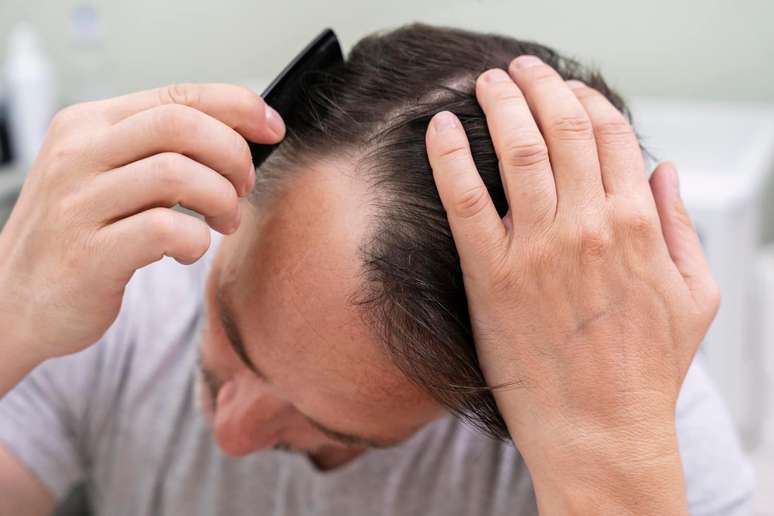Incorrect information on the use of finasteride and ductasterid are circulated on the internet: seeing what is true and what it is not
Summary
Finasteride and Ductasterid are effective and safe for the treatment of androgenetic alopecia, but require prescription and follow -up medical due to the possible, although rare, side effects and should be avoided in specific cases such as pregnancy and some comorbilities.
Among the various drugs currently available for androgenetic alopecia, popularly known as baldness, Finasteride has increasingly obtained importance for its high efficacy if indicated correctly. But recently, a series of videos and posts that highlight the dangers of Finasteride and other anti -ofndrogenic drugs, such as the Duttasteride, recently circulated on the Internet. But, according to the Brazilian society of dermatology-regional São Paulo (SBD-resp), many of these contents are based on incorrect information that creates great confusions around these substances, frightening and removing many patients who would benefit from the treatment.
“Anti-outing drugs, such as Finasteride and Duttasterid, have a series of large and relevant studies that demonstrate their effectiveness and show a good safety profile. Of course, like all drugs, there is always the possibility of adverse events, but what we need to know is the percentage in which these events occur”, says the dermatologist Caroline Romanlli, the secretary of the SBD-ANS.
According to Daniel Cassiano, the SBD-resp, Finasteride and Duttasteride dermatologist Director are drugs that act as 5-Alfa inhibitors Reductase. “This enzyme is responsible for the peripheral conversion of testosterone in dihydrotestosterone (DHT), a hormone that contributes to androgenetic alopecia by promoting the miniaturization of hair follicles,” explains the doctor.
With this action, the drugs are considered “gold standard” in the treatment of androgenetic alopecia.
“Finasteride and Duttasterid reduce the speed of the progression of baldness, stabilize the loss and decrease the miniaturization of the hair, that is, the hair for subtle”, says the dermatologist Leila David Bloch, fully member and SBD-Dep consultant.
But despite the proven efficacy and good results, many patients are afraid of using the drug due to the popular side effects. “But it must be strengthened that they are safe drugs and that the side effects can arise as in the use of any other medicine. Among these, the main adverse event that frightens patients is the decrease in libido, which is a possibility and occurs in about 10% of cases. However, this effect is reversible after the drug interruption,” says Leila.
Sexual dysfunctions are also another concern for patients, but Dr. Caroline Romanelli stresses that the events are rare. “In a blind study III study that compared the groups that ingested Finasteride 1 mg, conducted by 0.5 mg or placebo for 24 weeks, it was possible to observe that the presence of impotence between the groups was 6.1, 5.4 and 3.9%respectively.
Another consequence of these drugs that have been massively disclosed is the emergence of post-final syndrome, which, by definition, occurs when, even after six months of interruption of the treatment, the last time the sexual effects.
“But to date, there is no scientific tests of post-final syndrome, that is, well-controlled studies that the sexual side effects of indefinite drugs are maintained,” Caroline, who says that Finasteride has an emany of about 8 hours and the two-week Dukester. cease.
“What there are currently reports of patients in which the side effects persist even after the interruption of the finasteride. But there is no causal test, that is, the cause-effect relationship with the finasteride directly, since it may have occurred, for example, due to the progress of age, by coincidence”, adds Leila.
Other adverse events commonly advertised by these drugs include an increased risk of depression, a reduction in fertility and insulin resistance, but the latter has no evidence that demonstrate its occurrence due to the use of finasteride and ductasteride.
“As regards fertility, there is a decrease in the volume of ejaculatory which is reversible after the suspension of drugs. Therefore there is no absolute contraindication to suspend drugs during family planning,” says Caroline. “The risk of depression is more common in patients with a previous history of the disease, since drugs surpass the barrier of echo in the blood, that is, it can have an action in the central nervous system. So these patients should consult the psychiatrist before starting the treatment”, adds Leila.
So the best approach is to identify the treatment, with adequate prescription and management of possible side effects for safe and effective treatment. “Before the prescription of anti -itendogenic medicines, we ask the exams to eliminate other possible causes of hair loss. Furthermore, specific exams for liver functions, testosterone and sperm can also be requested, can also be invited to guarantee the safety of the treatment”, says Leia, which adds that, once the treatment has started, it is the responsibility of the doctor to evaluate whether there is a relationship between medicine and the possible public effects or public effects. when necessary.
“In the event of a side effect, the use of the half dose of drugs can be recommended, on an alternative or even topical finasteride, which still has their long -term therapeutic effect, although it is lower. The interruption can be indicated for patients who have tried to be pregnant for more than six months. In patients without setbacks, Sperm should be performed before the treatment and was indicated after six months to monitor the injury. Mask its increase, “underlines the dermatologist.
It is important to note that anti -itedogenic drugs are not indicated for all cases of hair loss, as can also be contraindicated in androgenetic alopecia. “Finasteride and Ductasterid can be indicated for cases of androgenetic alopecia and fibrous frontal alopecia. But they are not indicated for conditions such as telogen or alopecia alopecia”, says Leila Bloch.
Furthermore, they are not suitable for women of fertile age who are not using contraceptive methods, for example men who have tried to get pregnant for more than six months and patients with comorbilities such as serious depression or liver failure. “Finasteride must not be used by pregnant women or attempts, as it is teratogenic and can damage the fetus. Not even the infants should use, as there are no security tests in this group”, adds Daniel Cassiano.
In the end, the most important is the accompaniment with the dermatologist. “The doctor will be responsible for the diagnosis, customization of the treatment based on the severity of alopecia and the evaluation of all aspects of patient health. With this supervision, the professional can adapt the dosage, change the drug or even suggest other alternatives there are some side effects, ensuring that the treatment is safe and effective”, says Caroline Romanelli.
Among the pharmacological treatments, in addition to Finasteride and Duttasterid, there is also Minoxidil, which, although also interfering with the cycle and progression of baldness, is not the most important in the long term, compared to the finasteride, according to Leila David Bloch. “We can also indicate procedures for the release of drugs, such as intradermotherapy and MMP, with substances injected directly into the scalp. There is also surgical treatment, since clinical treatment is in insulation that all wires are not recovering. Therefore, for hair loss, it is suitable for hair loss, concludes the doctor.
It inspires the transformation into the world of work, business, society. It is the creation of the compass, content and the connection agency.
Source: Terra
Ben Stock is a lifestyle journalist and author at Gossipify. He writes about topics such as health, wellness, travel, food and home decor. He provides practical advice and inspiration to improve well-being, keeps readers up to date with latest lifestyle news and trends, known for his engaging writing style, in-depth analysis and unique perspectives.






![It All Begins Here: What’s in store for Tuesday 21 October 2025 Episode 1289 [SPOILERS] It All Begins Here: What’s in store for Tuesday 21 October 2025 Episode 1289 [SPOILERS]](https://fr.web.img3.acsta.net/img/99/48/99481db5c03e1ff295fce95b23125991.jpg)
